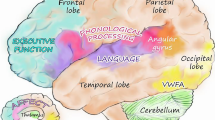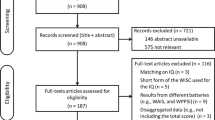Abstract
The brain executive functions (EFs) are crucial for various aspects of child development, as they stipulate control of cognitive processes and behavior. Speech development is one of the most important goals of preschool age and a defining predictor of successful school education. Both classical and contemporary studies emphasize relations between these functions. In order to achieve an in-depth comprehension of the relations we have deepened a comparative neuropsychological research by means of complemented speech function assessment (phonological process, verbal memory, motor program sequencing, grammatical and lexical speech design, planning of utterance) and conducted it targeting children aged 5–6 (n = 61, average age 5.67 ± 0.33 years) and 6–7 (n = 117, average age 6.67 ± 0.29 years) years. The research has revealed age-specific differences of the given age groups (verbal memory (р ≤ 0.002), comprehension of logical grammatical constructions (р < 0.001), lexical (р = 0.031) and grammatical (р = 0.008) speech design, and planning of utterance (р < 0.001)). The coherence of speech and the state of EF development increases in the age from 5–6 to 6–7 years and is evident in various aspects of coherent speech (planning of utterance and its grammatical and, to a lesser degree, lexical speech design), verbal memory, and verbal logical thinking; in phonological processing, motor program sequencing, and comprehension of logical grammatical constructions, however, it is less evident as it is related to particular indexes, but still exists. The research findings can be used to further voluntary regulated speech development and correction programs targeting senior preschoolers, as well as to develop voluntary regulation and control incorporating various speech components.


Similar content being viewed by others
Notes
An example of an active voice with a reverse word order is the phrase “A girl is pulling out a boy,” and an example of a passive voice with a reverse word order is the phase “A car is being transported by a tractor.”
REFERENCES
Luria, A.R., Osnovy neiropsikhologii (Fundamentals of Neuropsychology), Moscow: Mosk. Gos. Univ., 1973.
Diamond, A., Normal development of prefrontal cortex from birth to young adulthood: cognitive functions, anatomy, and biochemistry, Principles of Frontal Lobe Function, Stuss, D.T. and Knight, R.T., Eds., Oxford University Press, 2002, p. 466.
Diamond, A., Executive functions, Annu. Rev. Psychol., 2013. vol. 64, p. 135.
Miyake, A., Friedman, N.P., Emerson, M.J., et al., The unity and diversity of executive functions and their contributions to complex “frontal lobe” tasks: a latent variable analysis, Cognit. Psychol., 2000, vol. 41, no. 1, p. 49.
Machinskaya, R.I., The brain executive systems, Zh. Vyssh. Nervn. Deyat. im. I. P. Pavlova, 2015, vol. 65, no. 1, p. 33.
Niendam, T.A., Laird, A.R., Ray, K.L., et al., Meta-analytic evidence for a superordinate cognitive control network sub- serving diverse executive functions, Cognit. Affect. Behav. Neurosci., 2012, vol. 12, no. 2, p. 241.
Bull, R., Espy, K.A., and Wiebe, S.A., Short-term memory, working memory, and executive functioning in preschoolers: longitudinal predictors of mathematical achievement at age 7 years, Dev. Neuropsychol., 2008, vol. 33, no. 3, p. 205.
Geoffroy, M.-C., Côté, S.M., Giguère, C.-É., et al., Closing the gap in academic readiness and achievement: the role of early childcare, J. Child Psychol. Psychiatry, 2010, vol. 51, no. 12, p. 1359.
Kurgansky, A.V., Assessment of executive functions in children aged 3−6 years old: current state, challenges, and perspectives, Neurosci. Behav. Physiol., 2022, vol. 52, no. 2, p. 297. https://doi.org/10.1007/s11055-022-01237-z
Mozgovye mekhanizmy formirovaniya poznavatel’noi deyatel’nosti v predshkol’nom i mladshem shkol’nom vozraste (Brain Mechanisms of Cognitive Activity in Preschool and Minor-School-Age Children), Machinskaya, R.I. and Farber, D.A., Eds., Moscow: Mosk. Psikhol.-Sots. Univ., 2014.
Garon, N., Bryson, S.E., and Smith, I.M., Executive function in preschoolers: a review using an integrative framework, Psychol. Bull., 2008, vol. 134, no. 1, p. 31.
Vygotsky, L.S., Orudiye i znak v razvitii rebenka: izbrannye ntudy v 6 tomahk (Tool and Sign in Child Development, Collected Works in Six Volumes), vol. 6: Nauchnoe nasledstvo (Scientific Heritage), Moscow: Pedagogika, 1984, p. 5.
Luria, A.R., Basic Problems of Neurolinguistics, Hague: Mouton de Gruyter, 1976. https://doi.org/10.1515/9783110800159
Shokrkon, A. and Nicoladdis, E., The directionality of the relationship between executive functions and language skills: a literature review, Front. Psychol., 2022, vol. 13, p. 848696.
Akhutina, T.V., Kamardina, I.O., and Pylaeva, N.M., Neiropsikholog v shkole (Neuropsychologist at School), Moscow.: V. Sekachev, 2016.
Metody neyropsikhologicheskogo obsledovaniya detey 6—9 let (Methods of Neuropsychological Assessment for Children 6−9 Years Old), Akhutina, T.V., Ed., Moscow: V. Sekachev, 2017.
Semenova, O.A., A technique for estimating voluntary activity control in children of primary school age, Nov. Issled. Al’manakh, 2006, vol. 10, no. 2, p. 71.
Semenova, O.A., Machinskaya, R.I., and Lomakin, D.I., The influence of the functional state of brain regulatory systems on the programming, selective regulation and control of cognitive activity in children: I. Neuropsychological and EEG analysis of age-related changes in brain regulatory functions in children aged 9−12 years, Hum. Physiol., 2015, vol. 41, no. 4, p. 345. https://doi.org/10.1134/S036211971504012X
Zakharova, M.N. and Machinskaya, R.I., Age-related changes in executive functions in children aged 6—7 years, Psykhol. Issled., 2022, vol. 15, no. 81, p. 6.
Engelhardt, P.E., Nigg, J.T., and Ferreira, F., Is the fluency of language outputs related to individual differences in intelligence and executive function? Acta Psychol., 2013, vol. 144, no. 2, p. 424.
Baddeley, A., Gathercole, S., and Papagno, C., The phonological loop as a language learning device, Psychol. Rev., 1998, vol. 105, no. 1, p. 158.
Netelenbos, N., Gibb, R.L., Li, F., and Gonzalez, C.L.R., Articulation speaks to executive function: an investigation in 4- to 6-year-olds, Front. Psychol., 2018, vol. 9, p. 172.
Ekerim, M. and Selcuk, B., Longitudinal predictors of vocabulary knowledge in Turkish children: the role of maternal warmth, inductive reasoning, and children’s inhibitory control, Early Educ. Dev., 2017, vol. 29, no. 3, p. 1.
McClelland, M.M., Cameron, C.E., Connor, C.M., et al., Links between behavioral regulation and preschoolers’ literacy, vocabulary, and math skills, Dev. Psychol., 2007, vol. 43, no. 4, p. 947.
Mirman, D. and Britt, A.E., What we talk about when we talk about access deficits, Philos. Trans. R. Soc., B, 2013, vol. 369, no. 1634, p. 20120388.
Author information
Authors and Affiliations
Contributions
M.N. Zakharova: concept development, research, statistical analysis, data visualization, text preparation, and approval of the final version of the article. A.R. Agris: conducting research and preparing and editing the text.
Corresponding author
Ethics declarations
Conflict of interest. The authors declare the absence of obvious and potential conflicts of interest related to the publication of this article.
Statement of compliance with standards of research involving humans as subjects. All studies were conducted in accordance with the principles of biomedical ethics formulated in the Declaration of Helsinki 1964 and its subsequent updates and approved by the local ethics committee of the Institute of Developmental Physiology of the Russian Academy of Education (Moscow).
Informed consent. Each study participant (parent or legal representative of a child participating in the study) provided a voluntary written informed consent signed after explaining the potential risks and benefits, as well as the nature of the upcoming study.
Additional information
Translated by M. Batrukova
Rights and permissions
About this article
Cite this article
Zakharova, M.N., Agris, A.R. The Development of Various Speech Components and Their Relations with the State of the Brain Executive Functions in Senior Preschool Age. Hum Physiol 49, 242–250 (2023). https://doi.org/10.1134/S0362119723700275
Received:
Revised:
Accepted:
Published:
Issue Date:
DOI: https://doi.org/10.1134/S0362119723700275




